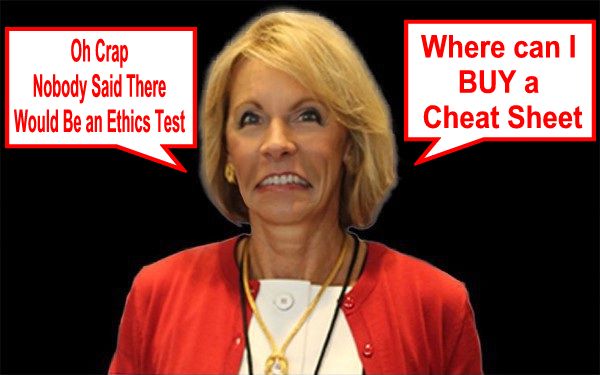Betsy DeVos’s ethics review raises further questions for Democrats and watchdogs

Betsy DeVos, President Trump’s nominee to lead the Education Department, promised late last week to divest from more than 100 entities to avoid potential conflicts of interest with her new job. But there are important unanswered questions about the considerable financial interests — including, it appears, in education-related companies — that DeVos will continue to hold, according to Democrats and ethics watchdogs.
DeVos’s supporters point out that DeVos’s handling of her investments have been blessed by the Office of Government Ethics (OGE), which signed off on her financial disclosures and ethics agreement last week. They accuse her critics of mounting a groundless political attack.
“The OGE was created to be an independent and impartial mechanism for preventing conflicts of interest among executive branch officials, and OGE certification is broadly considered the gold standard of ethics reviews,” said Ed Patru, spokesman for Friends of Betsy DeVos, a group of supporters. “The OGE has spent weeks reviewing Betsy’s financial holdings, it produced a sterling report that is both thorough and comprehensive, and Betsy intends to abide fully by OGE’s findings. I hope Betsy’s political opponents are not suggesting a return to the pre-Watergate era in which ethics judgments were determined by partisan personal opinions instead of objective and independent guidance.”
Under her agreement with federal ethics officials, DeVos will continue to serve as a co-trustee in three family trusts that benefit her and her husband, Dick DeVos Jr.
Her disclosures do not list assets for two of the trusts, so there is no sense of whether they have investments in education companies that might present potential conflicts of interest. Patru declined to say why she did not disclose information about the assets in those two trusts.
OGE spokesman Vincent Salamone would not discuss the specifics of DeVos’s review, but he said that nominees are under no obligation to identify the assets in a trust. What’s most important, he said, is that assets are listed for ethics officials to do the conflict of interest review.
“Someone has got to find out what the holdings are, so they can advise her what she needs to recuse from,” said Kathleen Clark, a law professor at Washington University. “The holdings would have to be revealed to someone at the very least in the Department of Education or the Office of Government Ethics, so that person can adequately help put in place procedures so she doesn’t end up violating the statute.”
DeVos disclosed her holdings in a third trust. It has an indirect financial stake in Sextant Education, which operates a chain of for-profit colleges, through its parent company AEA Investors. The trust also holds an interest in Discovery Communications, which is perhaps best known for operating cable television channels such as Animal Planet and TLC, but which also sells services and products to schools, including digital textbooks and teacher training, according to its website.
“If she has some kind of investment in an entity involved in these issues, then she should recuse herself from making decisions affecting those issues,” said Meredith McGehee, a government Betsy DeVos’s ethics review raises further questions for Democrats and watchdogs - The Washington Post:
